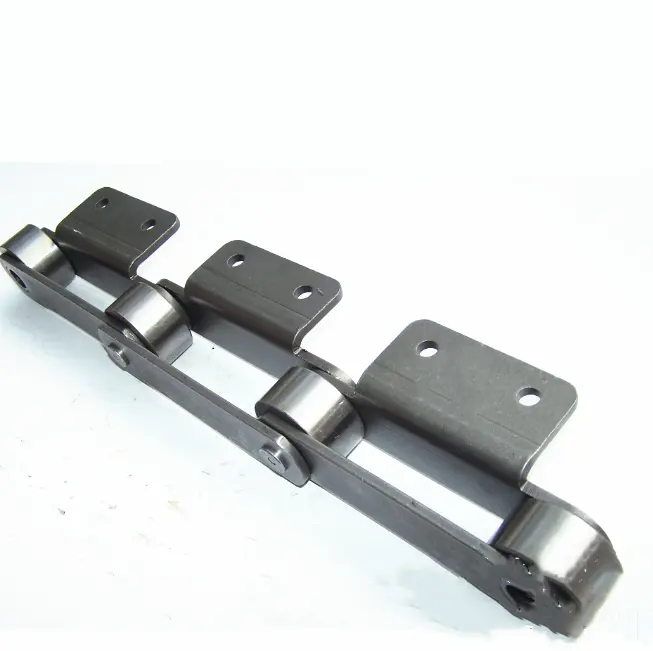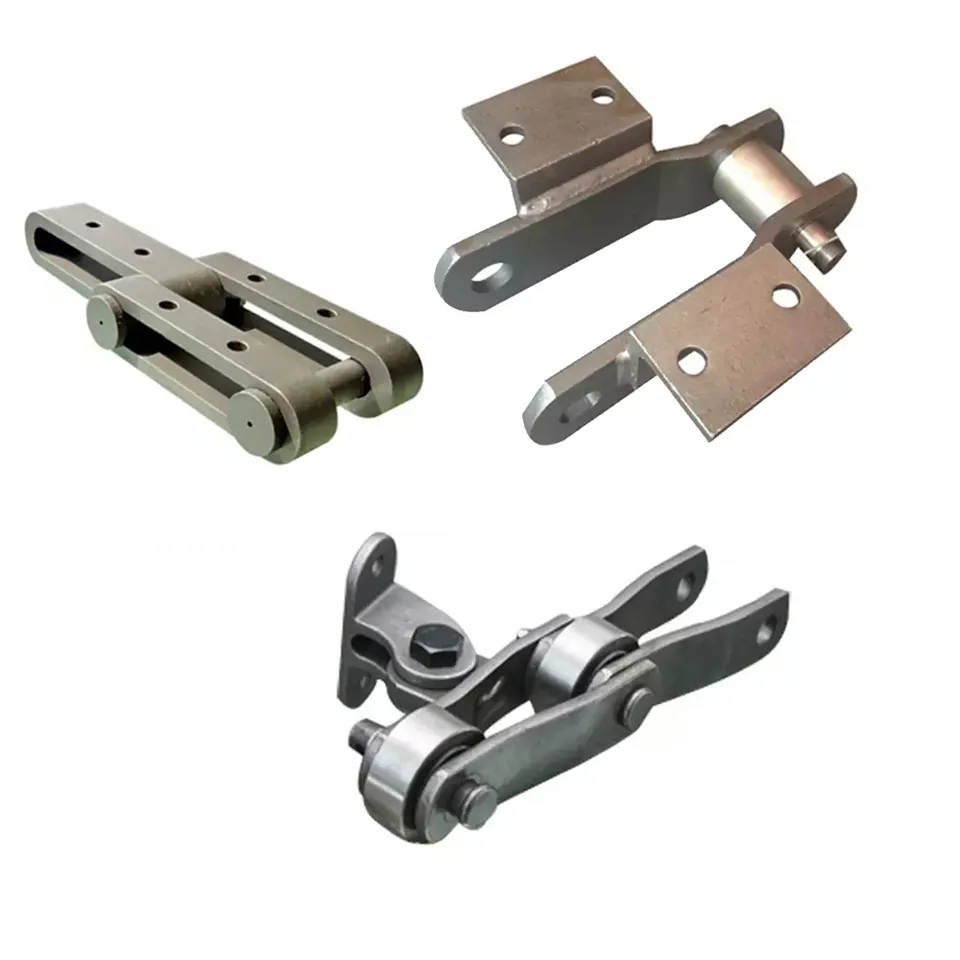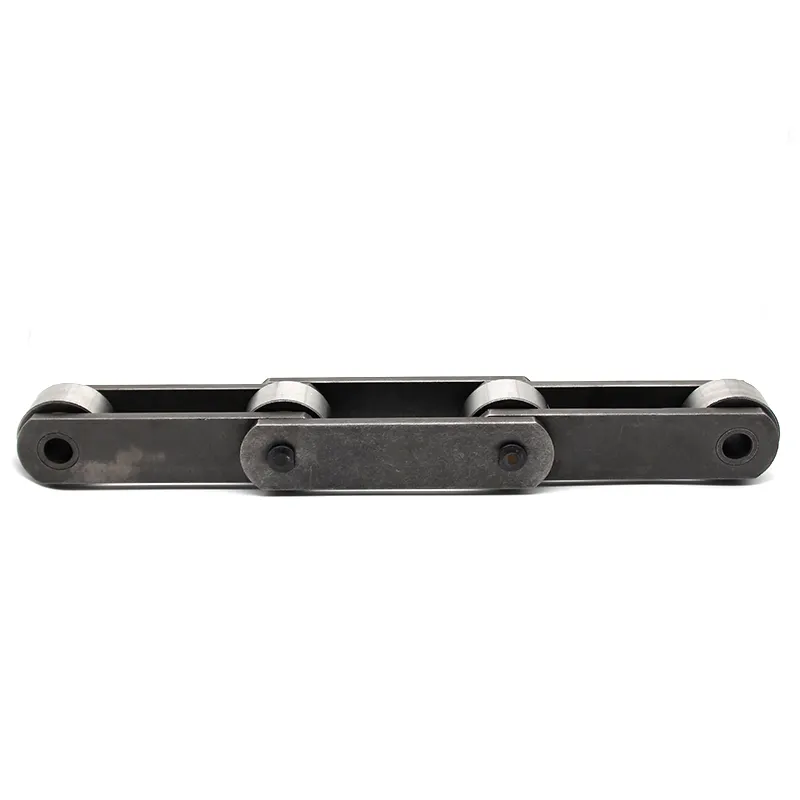Product Description
Welded Mill Chain with Attachments
A1/A2 K1/K2 R2/RR2 S1 F4 H1/H2 RF2/RF12 A22
Straight sidebar welded steel chain
Offset Sidebar Welded Steel Chains
Welded Steel Mill and Drag Chains
W Series Welded Steel Mill Chain
WH Series Welded Steel Mill Chain
WD Series Welded Steel Drag Chain
WD welede steel chain c/w heat treated rivets
WH welded steel chain-fully heat treated
WHIBR fully heat treated plus further induction hardened barrels&rivets
WHIBRS same as IBR plus sidebar wear surfaces
WD welded steel drag chain
XHD extra heavy duty
CS cast steel barrel
Welded steel drag chain is built according to ISO 6971 and ANSI B29.;18M.; Products provide efficient and economical service when used in chip and sawdust conveyors,; and like applications.; Reverse barrel is available.; Attachments includes C1,; C3,; C4,; RR and Wing.;
With their large wide pushing area,; welded steel drag chains provide sizeable carrying capacity when operated at moderate speeds.; They can be run in the same troughs and on the same sprockets as their cast chain counterparts.;
Welded Steel Mill Chain includes offset sidebar welded steel mill chain(or cranked link welded steel mill chain);,; straight sidebar welded steel mill chain and welded stainless steel mill chain as per ISO 6972 and ANSI B29.;16M.; These versatile welded steel chains are used throughout the forest products industry and paper processing industries as economical alternative for comparable cast chains.; Manufactured with the most advanced techniques,; equipment and high quality steels,; these chains offer improved resistance to wear and shock loads for a broad range of applications of conveying,; transmission and elevations.; A variety of attachments are also available for different conveyor and elevator applications:; A1,; A2,; A22,; F2,; F4,; H1,; H2,; K1,; K2,; R1,; RR1,; R2,; R22,; W1.;
Welded steel mill chains are recommended for most conveying,; driving,; and elevating applications where a high-strength steel rollerless chain is required.; These chains will operate on the same sprockets as their cast chain counterparts.;
The direction of travel for welded Mill Chain is determined by the application.; If used in a conveyor application,; the direction should be with the open end first.; If used as a drive chain,; the closed end,; or the end with the barrel,; should be first.;
Chain No.; WR-78/WR-78-4/WR-82/WR-124/WR-111/WR-106/WR-132/WR-150/
WR-155/WR-157/WR-159/WR-200/
WH-78/WH-82/WH-124/WH-111/WH-132/WH-150/WH-155/WH-157/WH-159/WH-200
| Mill chain attachments |
| We 24 hours service for you! |
| Standard or Nonstandard: | Standard |
|---|---|
| Application: | Textile Machinery, Garment Machinery, Conveyer Equipment, Packaging Machinery, Electric Cars, Motorcycle, Food Machinery, Marine, Mining Equipment, Agricultural Machinery, Car |
| Surface Treatment: | Baking Paint |
| Structure: | Welded Chain |
| Material: | Cast Iron |
| Type: | Cranked Link Chain |
| Samples: |
US$ 15.71/Meter
1 Meter(Min.Order) | |
|---|
| Customization: |
Available
| Customized Request |
|---|

How do mill chains handle material flow and transfer in bulk handling applications?
Mill chains are specifically designed to handle material flow and transfer in bulk handling applications with efficiency and reliability. These chains are widely used in various industries, such as agriculture, mining, construction, and more, where bulk materials need to be transported in large quantities. Here’s how mill chains achieve material flow and transfer:
1. Robust Construction: Mill chains are constructed using high-quality materials, such as alloy steel, which provides excellent strength and durability. Their robust design allows them to handle heavy loads and withstand the stresses of continuous material transfer.
2. Precise Alignment: The design of mill chains ensures precise alignment between the chain and sprockets. This alignment helps to maintain a smooth and consistent material flow, reducing the risk of jams or blockages in the system.
3. Flexibility: Mill chains are flexible enough to adapt to various conveyor configurations, including inclined or declined conveyors. This flexibility enables them to efficiently transport materials across different terrains and elevations.
4. Low Friction: Mill chains are designed to minimize friction during operation. This low friction characteristic reduces the energy consumption and wear on the chain, resulting in a longer service life and improved material transfer efficiency.
5. Adaptability: Mill chains are suitable for handling a wide range of bulk materials, including grains, aggregates, ores, coal, wood chips, and more. Their adaptability makes them a versatile choice for different industries.
6. Conveyor Systems: In bulk handling applications, mill chains are commonly used in conveyor systems. These systems utilize rotating sprockets to move the chain, and the material is carried along the conveyor’s path, ensuring a continuous flow of materials from one point to another.
7. Bucket Elevators: Mill chains are often employed in bucket elevators, which lift and transfer bulk materials vertically. The buckets attached to the chain scoop up the material and discharge it at the desired location, providing an efficient material handling solution.
Overall, mill chains are essential components in bulk handling applications, ensuring the smooth and consistent flow of materials in various industrial processes. Their reliable performance, strength, and adaptability make them a preferred choice for material transfer in many industries.

What are the safety considerations when using mill chains in industrial settings?
Safety is of utmost importance when using mill chains in industrial settings. Proper maintenance, installation, and operation are crucial to ensure the safe and efficient functioning of the equipment. Here are some key safety considerations:
1. Training and Education: Workers operating and maintaining the mill chains should receive proper training and education on equipment handling, safety protocols, and emergency procedures.
2. Personal Protective Equipment (PPE): Operators and maintenance personnel should wear appropriate PPE, such as safety gloves, safety goggles, and protective clothing, to prevent injuries during handling and maintenance.
3. Regular Inspections: Conduct routine inspections of the mill chains to identify any signs of wear, damage, or malfunction. Address any issues promptly to avoid potential accidents.
4. Lubrication: Proper and regular lubrication of the mill chain is essential to reduce friction and wear. However, ensure that lubricants used are compatible with the application and do not pose any health hazards.
5. Load Capacity: Do not exceed the recommended load capacity of the mill chain. Overloading can lead to premature failure and accidents.
6. Guarding: Install appropriate guards and safety devices to prevent accidental contact with moving parts of the mill chain and reduce the risk of entanglement.
7. Emergency Stop Devices: Equip the mill chain system with emergency stop devices that allow workers to quickly halt the operation in case of emergencies or potential hazards.
8. Handling Hazardous Materials: If the mill chain is used in handling hazardous materials, ensure that proper containment and safety measures are in place to prevent spills and exposures.
9. Environmental Considerations: Be mindful of the environmental impact of using mill chains. Follow proper waste disposal procedures and consider eco-friendly alternatives when applicable.
10. Compliance with Regulations: Ensure that the mill chains and associated equipment comply with relevant safety regulations and standards set by regulatory authorities.
By adhering to these safety considerations and maintaining a proactive safety culture, the risk of accidents and injuries in industrial settings can be significantly reduced, creating a safer and more productive work environment.

How do mill chains perform in dusty or dirty environments, such as in sawmills?
Mill chains are designed to perform well in dusty and dirty environments, making them suitable for use in sawmills and other similar applications. Here’s how mill chains handle such conditions:
1. Dust and Debris Resistance: Mill chains are constructed with durable materials and precision manufacturing to minimize the impact of dust and debris. They have sealed joints and tight clearances between components, reducing the chances of contaminants entering the chain’s interior. This design helps to maintain smooth operation and prevent premature wear and failure caused by abrasive particles.
2. Lubrication: Proper lubrication is essential for mill chains operating in dusty environments. Lubricants not only reduce friction and wear but also act as a barrier against dust and dirt, preventing them from settling on the chain’s surfaces. Lubrication also helps to protect the chain from corrosion, which can be a concern in some dusty environments.
3. Regular Maintenance: Keeping the mill chains clean and well-maintained is crucial for their performance in dusty or dirty environments. Regular cleaning and inspection can help remove accumulated debris and identify any signs of wear or damage that may require attention. Chains should be periodically lubricated and adjusted to ensure optimal performance.
4. Chain Selection: Choosing the right type of mill chain for the specific conditions in a sawmill is essential. There are various chain designs and materials available, each suited to different environments. Chains with protective coatings or materials that resist dust and debris can be particularly beneficial in sawmill applications.
Overall, mill chains are designed to be reliable and robust, making them well-suited for demanding environments like sawmills. Proper maintenance and chain selection can further enhance their performance and longevity in these conditions.


editor by CX 2023-08-08
